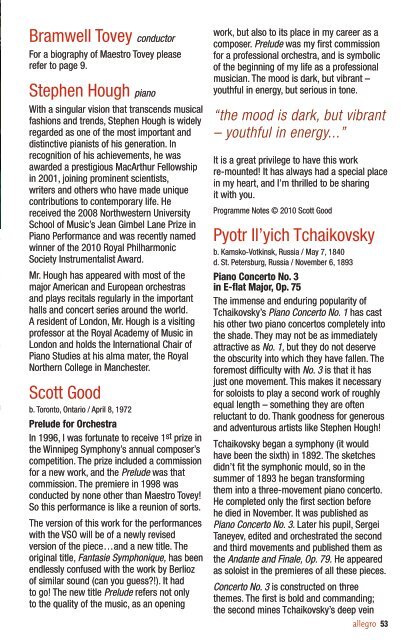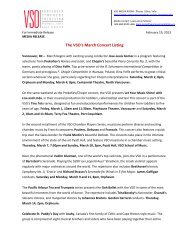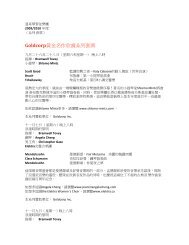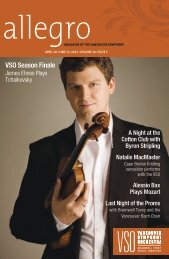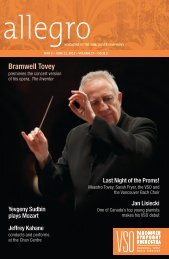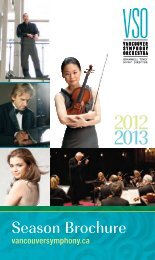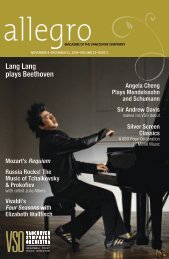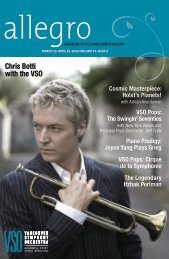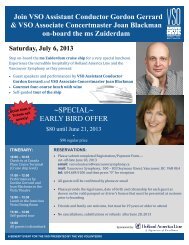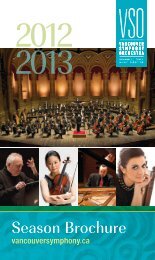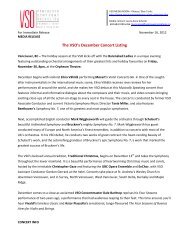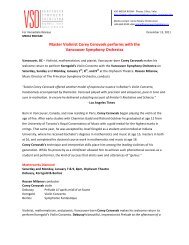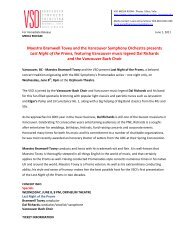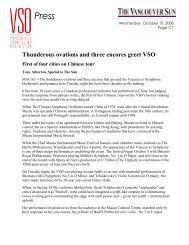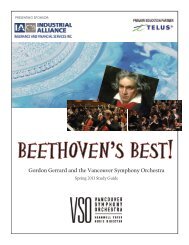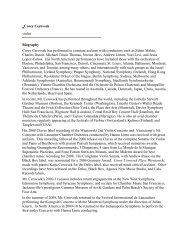issue one - Vancouver Symphony Orchestra
issue one - Vancouver Symphony Orchestra
issue one - Vancouver Symphony Orchestra
You also want an ePaper? Increase the reach of your titles
YUMPU automatically turns print PDFs into web optimized ePapers that Google loves.
Bramwell Tovey conductor<br />
For a biography of Maestro Tovey please<br />
refer to page 9.<br />
Stephen Hough piano<br />
With a singular vision that transcends musical<br />
fashions and trends, Stephen Hough is widely<br />
regarded as <strong>one</strong> of the most important and<br />
distinctive pianists of his generation. In<br />
recognition of his achievements, he was<br />
awarded a prestigious MacArthur Fellowship<br />
in 2001, joining prominent scientists,<br />
writers and others who have made unique<br />
contributions to contemporary life. He<br />
received the 2008 Northwestern University<br />
School of Music’s Jean Gimbel Lane Prize in<br />
Piano Performance and was recently named<br />
winner of the 2010 Royal Philharmonic<br />
Society Instrumentalist Award.<br />
Mr. Hough has appeared with most of the<br />
major American and European orchestras<br />
and plays recitals regularly in the important<br />
halls and concert series around the world.<br />
A resident of London, Mr. Hough is a visiting<br />
professor at the Royal Academy of Music in<br />
London and holds the International Chair of<br />
Piano Studies at his alma mater, the Royal<br />
Northern College in Manchester.<br />
Scott Good<br />
b. Toronto, Ontario / April 8, 1972<br />
Prelude for <strong>Orchestra</strong><br />
In 1996, I was fortunate to receive 1 st prize in<br />
the Winnipeg <strong>Symphony</strong>’s annual composer’s<br />
competition. The prize included a commission<br />
for a new work, and the Prelude was that<br />
commission. The premiere in 1998 was<br />
conducted by n<strong>one</strong> other than Maestro Tovey!<br />
So this performance is like a reunion of sorts.<br />
The version of this work for the performances<br />
with the VSO will be of a newly revised<br />
version of the piece...and a new title. The<br />
original title, Fantasie Symphonique, has been<br />
endlessly confused with the work by Berlioz<br />
of similar sound (can you guess!). It had<br />
to go! The new title Prelude refers not only<br />
to the quality of the music, as an opening<br />
work, but also to its place in my career as a<br />
composer. Prelude was my first commission<br />
for a professional orchestra, and is symbolic<br />
of the beginning of my life as a professional<br />
musician. The mood is dark, but vibrant –<br />
youthful in energy, but serious in t<strong>one</strong>.<br />
“the mood is dark, but vibrant<br />
– youthful in energy...”<br />
It is a great privilege to have this work<br />
re-mounted! It has always had a special place<br />
in my heart, and I’m thrilled to be sharing<br />
it with you.<br />
Programme Notes © 2010 Scott Good<br />
Pyotr Il’yich Tchaikovsky<br />
b. Kamsko-Votkinsk, Russia / May 7, 1840<br />
d. St. Petersburg, Russia / November 6, 1893<br />
Piano Concerto No. 3<br />
in E-flat Major, Op. 75<br />
The immense and enduring popularity of<br />
Tchaikovsky’s Piano Concerto No. 1 has cast<br />
his other two piano concertos completely into<br />
the shade. They may not be as immediately<br />
attractive as No. 1, but they do not deserve<br />
the obscurity into which they have fallen. The<br />
foremost difficulty with No. 3 is that it has<br />
just <strong>one</strong> movement. This makes it necessary<br />
for soloists to play a second work of roughly<br />
equal length – something they are often<br />
reluctant to do. Thank goodness for generous<br />
and adventurous artists like Stephen Hough!<br />
Tchaikovsky began a symphony (it would<br />
have been the sixth) in 1892. The sketches<br />
didn’t fit the symphonic mould, so in the<br />
summer of 1893 he began transforming<br />
them into a three-movement piano concerto.<br />
He completed only the first section before<br />
he died in November. It was published as<br />
Piano Concerto No. 3. Later his pupil, Sergei<br />
Taneyev, edited and orchestrated the second<br />
and third movements and published them as<br />
the Andante and Finale, Op. 79. He appeared<br />
as soloist in the premieres of all these pieces.<br />
Concerto No. 3 is constructed on three<br />
themes. The first is bold and commanding;<br />
the second mines Tchaikovsky’s deep vein<br />
allegro 53


